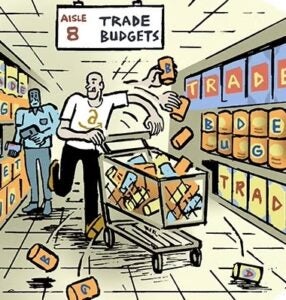 Twitter, as rumored, is developing an ad product specifically designed for app installs.
Twitter, as rumored, is developing an ad product specifically designed for app installs.
On Thursday, Twitter acknowledged the existence of the mobile app promotion suite, the first product that connects Twitter with the mobile ad exchange it inherited when it acquired MoPub last September.
Advertisers shouldn’t try to jump on board quite yet, however: The app promotion suite is available to some US advertisers in private beta and will likely remain so for at least the next few months, though the company will consider adding more beta test partners. It’s unclear how many there are now, and Twitter is proceeding methodically. By mid-year, it hopes to have enough information around how both Twitter users and advertisers react to the app install ads.
Here’s how it’s working so far for the beta testers – all of whom are joint Twitter advertisers and MoPub users: Advertisers can set up campaigns either via MoPub or through Twitter’s advertising portal ads.twitter.com. They can select the targeting parameters, choosing whether to place it on the Twitter feed, run it through the MoPub exchange or both. If the campaign is set to run through MoPub’s exchange via the ads.twitter.com portal, it’ll be “automatically translated into programmatic bids … on a level playing field with MoPub’s existing DSP partners,” according to a blog post by Twitter’s revenue product manager, Kelton Lynn.
Depending on the advertiser’s guidelines, the ads will appear either on a Twitter feed or off Twitter as an in-app display ad.
All of the targeting features associated with Promoted Tweets are available for users of the mobile app promotion suite. That is, advertisers can target around factors like keywords, interest categories and device type – particularly important for Android developers that want to avoid iOS users, or vice versa.
Additionally, advertisers can also take advantage of some of MoPub’s capabilities, like adding consumer information from third-party data providers like BlueKai.
So why might Twitter want to push into direct-response initiatives with these app install ads? Put simply, app install ads are lucrative and in demand. For many developers playing in a field glutted by apps, aggressive advertising is really the only way to get noticed. And app install ads are effective if placed on a popular site. For instance on Facebook, install rates for ads with click-to-install features are 10 times higher than on standard display ads.
There’s another driver contributing to the popularity of app install ads. At the SunTrust Internet & Digital Media Conference earlier this month, Nanigans marketing SVP Dan Slagen noted the format is useful for more than just gaming companies. “There is growing interest from the ecommerce space,” he said. “There’s travel, there’s what we’ll call the Internet-only, mobile-only companies – the Lifts and the Ubers of the world.”
While Facebook has been aggressive with its app install ads, Twitter’s advantage is its MoPub marketplace. While Facebook’s mobile ad network seems to operate in fits and starts, Twitter boasts MoPub is “one of the largest mobile ad exchanges in the world,” citing its reach of 1 billon unique devices and its handling of 130 billion ad requests across Android and iOS apps every month.
And some agency reps believe Twitter might have a further advantage with pricing.
In a previous interview with AdExchanger, Jeremy Leon, senior social strategist at agency Laundry Service, said Twitter’s steady CPM rates indicate it would have steady CPI rates. By contrast, he said, Facebook’s CPM rates have increased – which could mean greater CPI rates as well.













